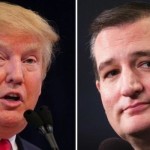The Wisconsin landslide propels Cruz in California – and New Jersey
By Alan Steinberg
 Ted Cruz did not just prevail in Wisconsin Tuesday night – he won a landslide. And that has major positive ramifications for him in the primary finale of the campaign in both New Jersey and California on Tuesday, June 7.
Ted Cruz did not just prevail in Wisconsin Tuesday night – he won a landslide. And that has major positive ramifications for him in the primary finale of the campaign in both New Jersey and California on Tuesday, June 7.
A bit of context is in order. The California GOP primary is presidential winner take all three delegates in each of the 53 Congressional districts, plus 10 at-large delegates to the statewide winner plus three Republican National Committee delegates (state GOP chair plus national committee man and woman), a total of 172 delegates. In New Jersey, all 51 delegates are bound to vote for the presidential primary winner on the first ballot.
If Ted Cruz wins a majority of the California delegates, it will be impossible for Donald Trump to win on the first ballot. If Donald Trump does not win on the first ballot, he has virtually no chance of winning the GOP presidential nomination.
Trump’s staff was totally unaware of the mechanism of delegate selection in various southern states, such as North Carolina and Georgia. These states now have GOP convention delegates bound to vote for primary winner Trump on the first ballot yet will vote for Cruz on the second.
If Ted Cruz wins both California and New Jersey, he has a real chance of winning the nomination on the first ballot. And all this comes to the surface while Donald Trump is having a political meltdown, both in terms of issue awareness and organizational purpose.
The fact of the matter is that Trump for President thus far has not been a cohesive political campaign, but instead, a one-person marketing venture conducted from top to bottom by Donald Trump himself. The goal of Trump’s effort is to sell himself to the American public as the man who can “make America great again”.
Political campaigns, however, in order to be successful, must be something more than mere personal marketing ventures. Successful presidential campaigns are organized efforts to keep the candidate briefed on issues and recruit delegate support.
It is obvious from the Trump delegate recruitment failures and his issues misstatements (punishment for women who have abortions, nuclear weapons for Japan, etc.) that for all practical purposes, no such Trump for President campaign exists. Furthermore, Trump appears to have a disdain for the need to have such a campaign. This will severely hamper Trump in the forthcoming primaries and state conventions, particularly in California, where Cruz has already in progress a highly developed ground game.
In California, the outlook is ideal for Ted Cruz. California is a
high-tech state, dependent on robust foreign trade. The Trump trade position, reminiscent of the Smoot- Hawley tariff policies of the 1930s, which transformed a recession into the Great Depression, will be anathema to both labor and management in the high tech sector.
Furthermore, the profile of the Republican primary voter is much different in California from that of the areas where Trump has shown his greatest strength. The Donald performs best among white working class male GOP voters. California Republican primary voters tend to be far more bourgeois. This hurts Trump and assists Cruz.
In New Jersey, despite the conventional wisdom, the character of the delegate slates and the effort being put forth by Kasich are major negative factors for Trump and positives for Cruz.
Normally, the identity of the delegates is a largely irrelevant factor in presidential primaries. Delegates can affect the brand of the candidate, however. Most significantly, in the case of the New Jersey GOP primary, the pro-Christie establishment brand of the Trump delegate slate vitiates The Donald’s ability to run as The Outsider.
Furthermore, over the years, New Jersey conservatives have become lukewarm, if not outright hostile towards Christie, largely due to his failure to transform the New Jersey Supreme Court into a more judicially conservative institution. In fact, by his reappointment of Chief Justice Stuart Rabner, one of the most activist liberal state jurists in America, Christie virtually guaranteed that the Garden State’s High Court would remain one with a reputation for legislating from the bench.
Thus, Christie is far from universally popular among New Jersey Republican primary voters. The Christie brand is an albatross for Donald Trump, hindering his ability to give the Trump brand the conservative and outsider image that it has had in other states. Voting against Donald Trump becomes an outlet for disgruntled New Jersey GOP primary voters to send Chris Christie a message.
By contrast, the views of the members of the New Jersey John Kasich delegate slate, led by former Governor Christie Whitman, have created for the Ohio governor a New Jersey brand of being socially moderate, particularly on the issues of abortion and gun control. Social moderates comprise a diminishing, yet still significant constituency among New Jersey GOP registrants.
These voters would normally cast their ballots for Trump, rather than Cruz, in a two candidate race. They will defect from Trump to Kasich in the forthcoming primary, however. While Kasich will finish third, he will do significant damage to Trump.
The Ted Cruz national brand and slogan is that of the “Courageous Conservative”. This brand is reinforced in New Jersey by his decidedly conservative delegates, most notably the presence of delegation leader and New Jersey state campaign chair Steve Lonegan.
Steve Lonegan is the Mr. Conservative of New Jersey politics. Nobody comes close to him in terms of holding the allegiance of rank and file New Jersey conservatives. Lonegan is a profound intellectual, a superb ground game organizer, and a magnificent communicator with an outstanding record of accomplishment as mayor of Bogota.
Lest we forget: In his losing primary race for governor against Chris Christie in 2009, Steve Lonegan garnered an astonishing 41 percent of the vote, despite the huge financial and establishment endorsement advantages of Christie.
Lonegan backers have a remarkable continuing degree of loyalty to him: They are not just supporters, they are followers.
Steve’s leadership of the Texas senator’s presidential campaign in New Jersey may result in the great bulk of his 2009 voters casting their ballot for Ted Cruz. If Cruz garners over 40 percent of the primary vote, like Lonegan in 2009, he will win the New Jersey primary.
Steve Lonegan is having a very good political year – in his national Cruz surrogate role, he is a constant interview presence on the national cable television networks. Win or lose, he has an outstanding prospect for becoming one of American television’s leading conservative commentators.
Yet Lonegan may have an even greater accomplishment ahead. If he leads the Ted Cruz campaign to victory in New Jersey, he, and not Chris Christie will chair the 2016 New Jersey Republican National Convention delegation.
I would not bet against that happening. A Cruz victory in New Jersey is a genuine possibility, notwithstanding the unwise New Jersey GOP conventional wisdom. Stay tuned.
Alan J. Steinberg served as Regional Administrator of Region 2 EPA during the administration of former President George W. Bush and as Executive Director of the New Jersey Meadowlands Commission under former New Jersey Governor Christie Whitman. The Ted Cruz for President Campaign announced Alan’s endorsement in December.










